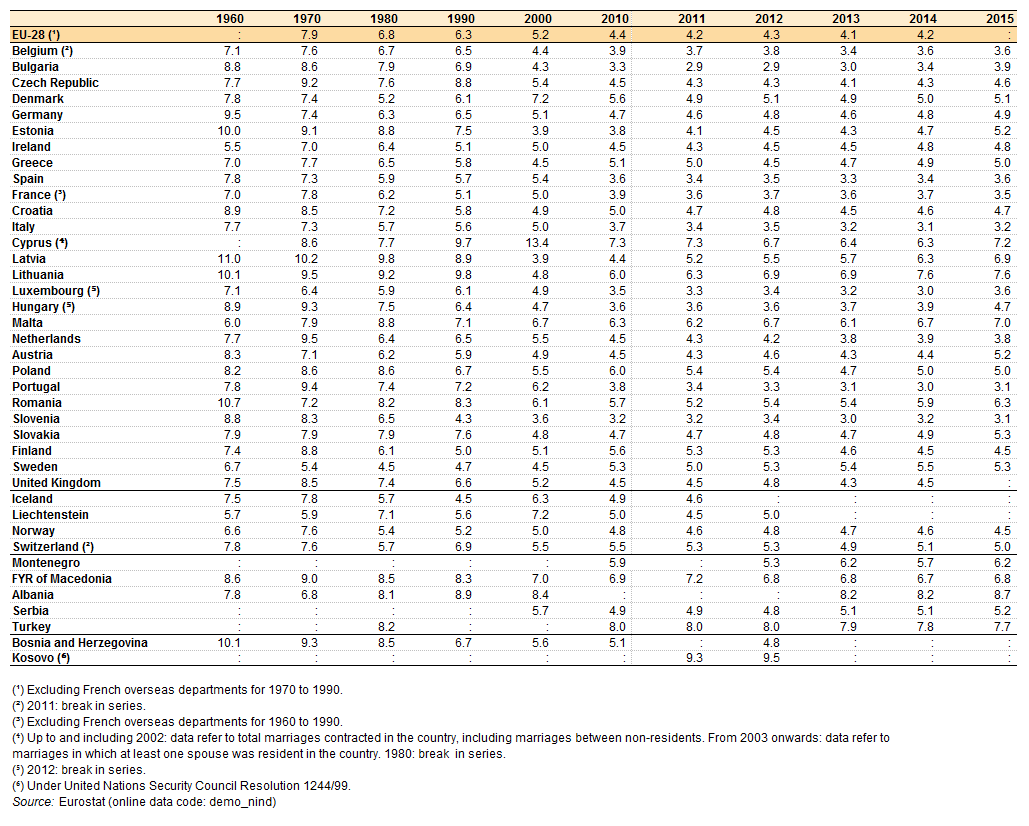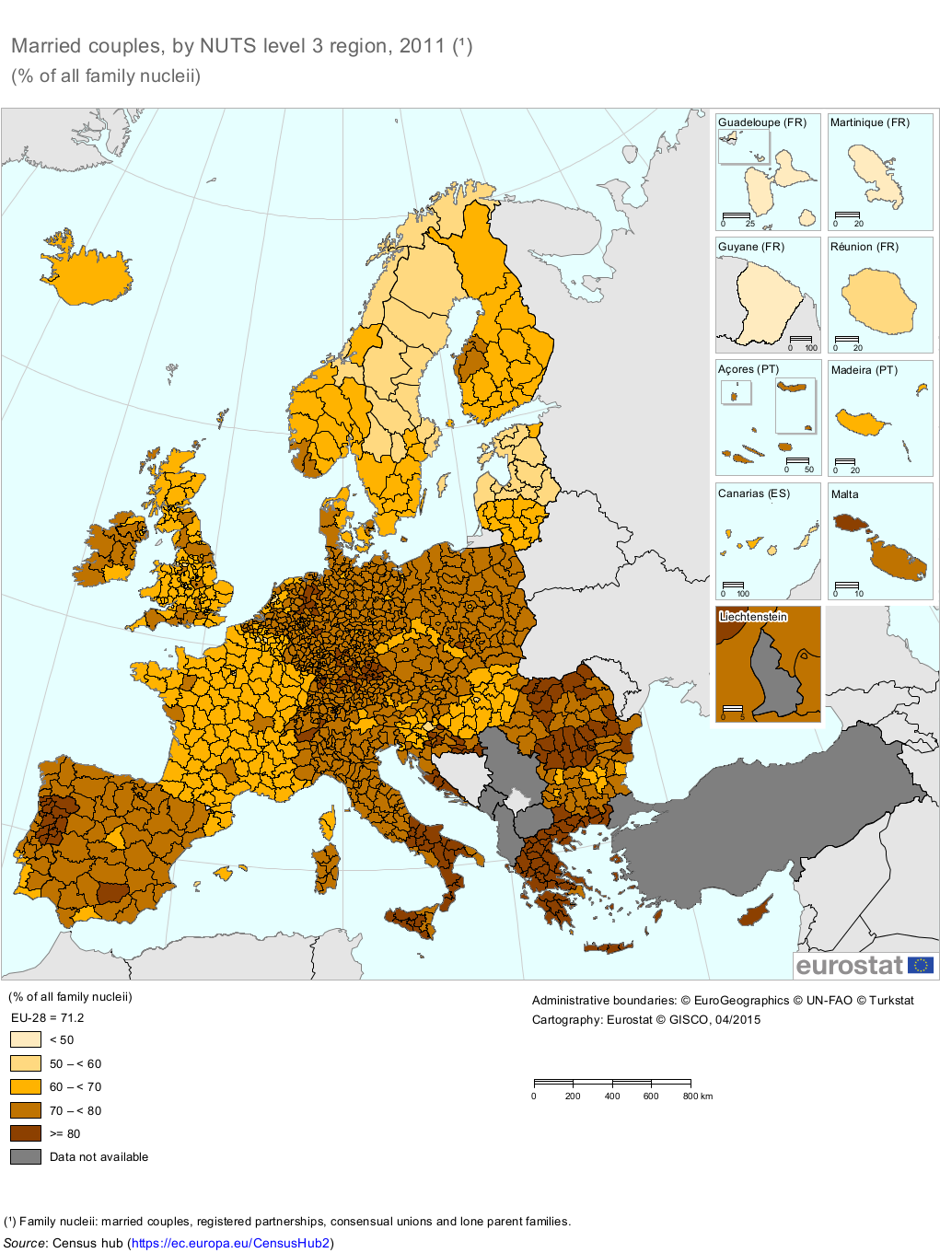In another thread, I was explaining how, for many Northwest Europeans, the decision to get married or live under a civil union or domestic partnership was often simply motivated by the desire to have a wedding party (still a dream for many women, regardless of their religiosity).
I was explaining how, statistically, couples who get married are more likely to split (divorce) than those who live together and have children together without getting married. Perhaps that's because on some unconscious level people think that once they are married they don't have to try as hard anymore.
I know plenty of people who live together just under a civil partnership and have just as much (or more) stability, sense of family and love as married people. Marriage is mostly a religious thing. Once religion becomes irrelevant, you don't need that label any more.
The way I see it is that if a couple is strictly monogamous, they don't need marriage to "consolidate" or officialise their union. After all, most birds mate for life and they don't get married. Players for whom monogamy isn't suited definitely should not get married either. So the question is, for whom is marriage designed? Is it for people who aren't too sure about their partner and need reassurance from the community (family, friends, state) that their union is stable? It doesn't work otherwise half of marriages wouldn't end up in divorce.
The reason why people marry is mostly cultural and religious. According to OECD stats, Americans have the highest marriage rate of any Western country after Russia (if it is considered 'Western') and Lithuania. The US marriage rate is almost twice higher than the EU average, and more similar to what it used to be in Western Europe in the 1960's and 70s. This table from Eurostat shows how the marriage rate in almost all European countries (except the most eastern ones) has fallen by half over the last 4 decades.

The disparities between countries already existed in the 70's. Germans used to have a higher marriage rate than the French or Brits, and they still do, even though all fell by half.
But the marriage rate doesn't take into account the discrepancy between people who never marry and never have kids, and those who do have children but without ever marrying. In Southern Europe the birth rate has dropped a lot along the marriage rate because fewer people get into long-term relationships with children. But that's not true of France, Britain or Scandinavia.
We see more clearly on this map that the countries with the highest percentages of children living with unmarried parents come from countries with a high percentage of atheists or non-religious people, such as France, Britain and Scandinavia.

In the USA having children out-of-wedlock has a bad rep because the vast majority of these children end up living in single-parent homes. Only 2% of American children live in a family with two cohabiting parents (as opposed to two married parents or a single parent), against 31% in Estonia, 26% in Sweden, 25% in France, 18% in Belgium and 14% in the UK. Even traditional minded (and relatively religious) Germans and Spaniards have 8% of them (four times more than in the US !).

So it looks like religion, or traditions influenced by religion, is still a determinant factor in whether parents feel the need to get married or not.
I was explaining how, statistically, couples who get married are more likely to split (divorce) than those who live together and have children together without getting married. Perhaps that's because on some unconscious level people think that once they are married they don't have to try as hard anymore.
I know plenty of people who live together just under a civil partnership and have just as much (or more) stability, sense of family and love as married people. Marriage is mostly a religious thing. Once religion becomes irrelevant, you don't need that label any more.
The way I see it is that if a couple is strictly monogamous, they don't need marriage to "consolidate" or officialise their union. After all, most birds mate for life and they don't get married. Players for whom monogamy isn't suited definitely should not get married either. So the question is, for whom is marriage designed? Is it for people who aren't too sure about their partner and need reassurance from the community (family, friends, state) that their union is stable? It doesn't work otherwise half of marriages wouldn't end up in divorce.
The reason why people marry is mostly cultural and religious. According to OECD stats, Americans have the highest marriage rate of any Western country after Russia (if it is considered 'Western') and Lithuania. The US marriage rate is almost twice higher than the EU average, and more similar to what it used to be in Western Europe in the 1960's and 70s. This table from Eurostat shows how the marriage rate in almost all European countries (except the most eastern ones) has fallen by half over the last 4 decades.

The disparities between countries already existed in the 70's. Germans used to have a higher marriage rate than the French or Brits, and they still do, even though all fell by half.
But the marriage rate doesn't take into account the discrepancy between people who never marry and never have kids, and those who do have children but without ever marrying. In Southern Europe the birth rate has dropped a lot along the marriage rate because fewer people get into long-term relationships with children. But that's not true of France, Britain or Scandinavia.
We see more clearly on this map that the countries with the highest percentages of children living with unmarried parents come from countries with a high percentage of atheists or non-religious people, such as France, Britain and Scandinavia.

In the USA having children out-of-wedlock has a bad rep because the vast majority of these children end up living in single-parent homes. Only 2% of American children live in a family with two cohabiting parents (as opposed to two married parents or a single parent), against 31% in Estonia, 26% in Sweden, 25% in France, 18% in Belgium and 14% in the UK. Even traditional minded (and relatively religious) Germans and Spaniards have 8% of them (four times more than in the US !).

So it looks like religion, or traditions influenced by religion, is still a determinant factor in whether parents feel the need to get married or not.



